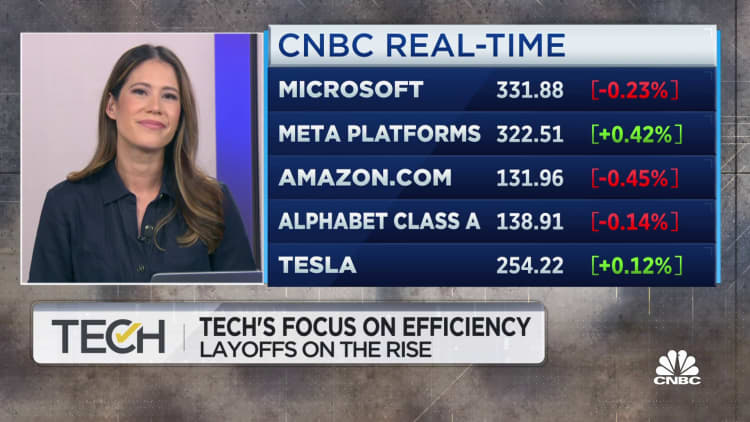[ad_1]
A man is seen using the LinkedIn app on a mobile device and a laptop computer in this illustration photo on 17 October, 2023.
Jaap Arriens | Nurphoto | Getty Images
LinkedIn debuted an artificial intelligence-powered chatbot Wednesday that it’s billing as a “job seeker coach,” and unveiled other generative AI tools for Premium members.
The rollouts were tied to an announcement from LinkedIn that its platform surpassed 1 billion members. For months, the Microsoft-owned company has been bolstering its focus on tools like automated recruiter messages, job descriptions and AI-powered profile writing suggestions.
The new AI chatbot, which aims in part to help users gauge whether a job application is worth their time, is powered by OpenAI’s GPT-4 and began rolling out to some Premium users Wednesday. Microsoft has invested billions of dollars into OpenAI.
LinkedIn’s engineering team had to put hefty resources on the platform side to reduce latency, according to Erran Berger, LinkedIn’s vice president of product engineering.
“We had to build a lot of stuff on our end to work around that and to make this a snappy experience,” Berger told CNBC in an interview. “When you’re having these conversational experiences, sometimes it’s almost like search — you expect it to be instant. And so there’s real platform capabilities we had to develop to make that possible.”
LinkedIn is trying to reaccelerate revenue growth after eight straight quarters of slowing expansion. Two weeks ago the company announced nearly 700 job cuts, with most coming from the engineering unit.
Users of the new chatbot can launch it from a job posting by selecting one of a few questions, such as “Am I a good fit for this job?” and “How can I best position myself for this job?” The former would prompt the tool to analyze a user’s LinkedIn profile and experience, with answers like, “Your profile shows that you have extensive experience in marketing and event planning, which is relevant for this role.”
The chatbot will also point to potential gaps in a user’s experience that could hurt them in the job application process.
“The quality of responses has to be really good for the stakes being as high as they are here, so we don’t take that lightly at all,” Gyanda Sachdeva, LinkedIn’s vice president of product management, told CNBC.
The user can also follow up by asking who works at the company, which will prompt the chatbot to send them a few employee profiles — potentially second- or third-degree connections — who the user can then message about the opportunity. The message itself can also be drafted using generative AI.
In the past, many uses of AI in hiring or job applications have faced criticism for bias against marginalized communities. One example was Amazon’s use of a recruiting engine that reportedly downvoted resumes that included the word “women” or mentioned women’s colleges. A separate study by the Harvard Business Review highlighted bias against black candidates in an analysis of respondents’ job board recommendations.
“We’ve invested a lot to make sure that this stays kind of within the guardrails of what meets our responsible AI standards,” Berger said. “You couple that with our own AI models for matching jobs, again, which we’ve been doing for a long time, you get this super-personalized, equity-minded experience for our job seekers.”
— CNBC’s Jordan Novet contributed reporting
WATCH: Tech layoffs return as LinkedIn, Qualcomm announce job cuts

[ad_2]

